Comparative Analysis of IFRS Implementation in Australia and India
VerifiedAdded on 2021/02/21
|15
|3962
|56
Report
AI Summary
This report provides a comprehensive analysis of International Financial Reporting Standards (IFRS) implementation in Australia and India. It begins by outlining the relevance of the conceptual framework of financial reporting, detailing its importance in providing guidelines for financial activities and ensuring consistency in comprehension. The report then compares and contrasts the adoption of IFRS in both countries, examining the reasons behind their adoption, the transitional issues faced, and the challenges encountered by companies. It explores the benefits gained by reporting entities, such as improved financial statement quality and the ability to attract foreign investment. The report concludes by evaluating the success of IFRS adoption in both countries and offers recommendations to the accounting bodies of Australia and India to maintain the relevance of international standards. The analysis covers aspects like the role of the Australian Accounting Standards Board (AASB) and the Institute of Chartered Accountants of India (ICAI) in the process.

Accounting theory and current issues
Paraphrase This Document
Need a fresh take? Get an instant paraphrase of this document with our AI Paraphraser
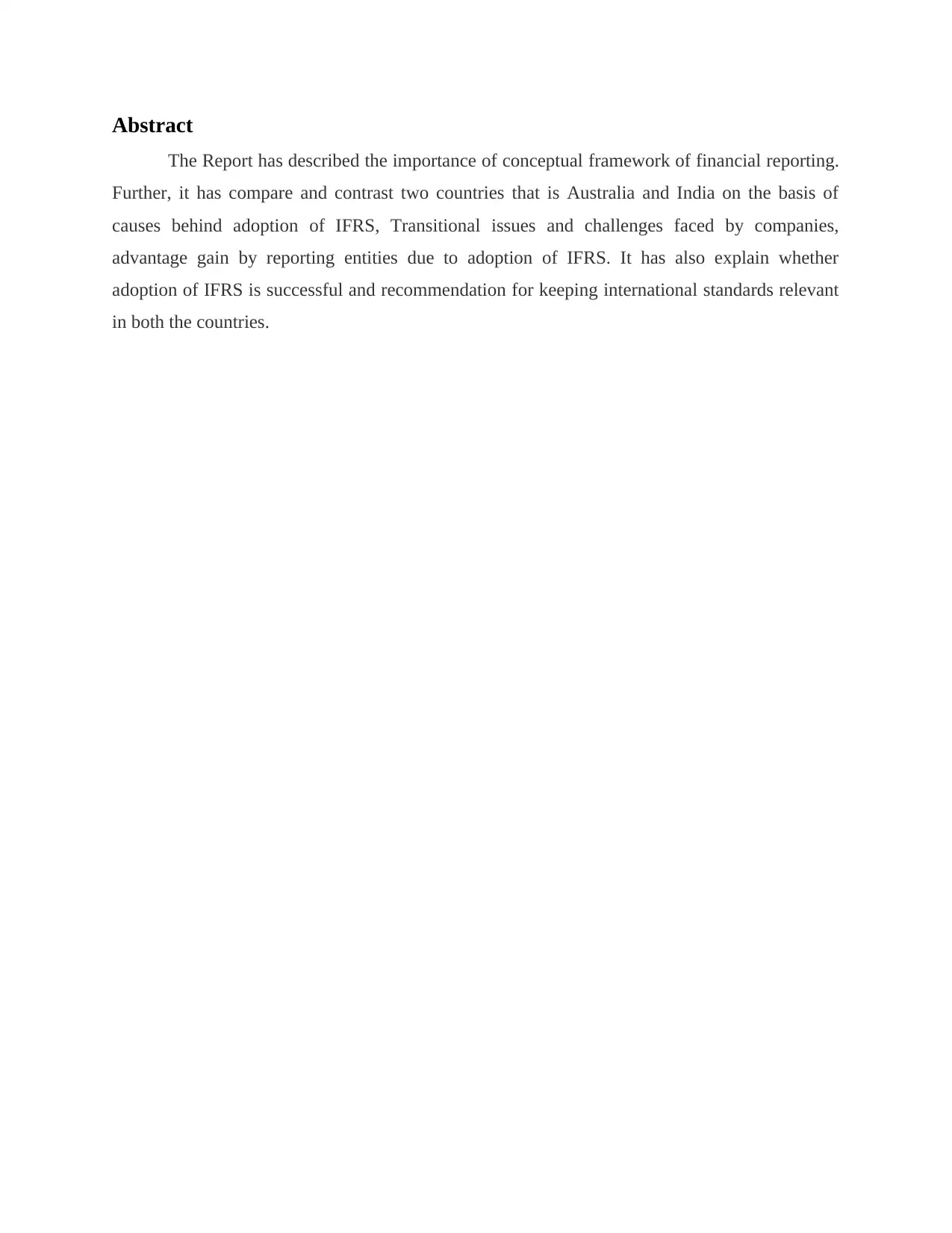
Abstract
The Report has described the importance of conceptual framework of financial reporting.
Further, it has compare and contrast two countries that is Australia and India on the basis of
causes behind adoption of IFRS, Transitional issues and challenges faced by companies,
advantage gain by reporting entities due to adoption of IFRS. It has also explain whether
adoption of IFRS is successful and recommendation for keeping international standards relevant
in both the countries.
The Report has described the importance of conceptual framework of financial reporting.
Further, it has compare and contrast two countries that is Australia and India on the basis of
causes behind adoption of IFRS, Transitional issues and challenges faced by companies,
advantage gain by reporting entities due to adoption of IFRS. It has also explain whether
adoption of IFRS is successful and recommendation for keeping international standards relevant
in both the countries.
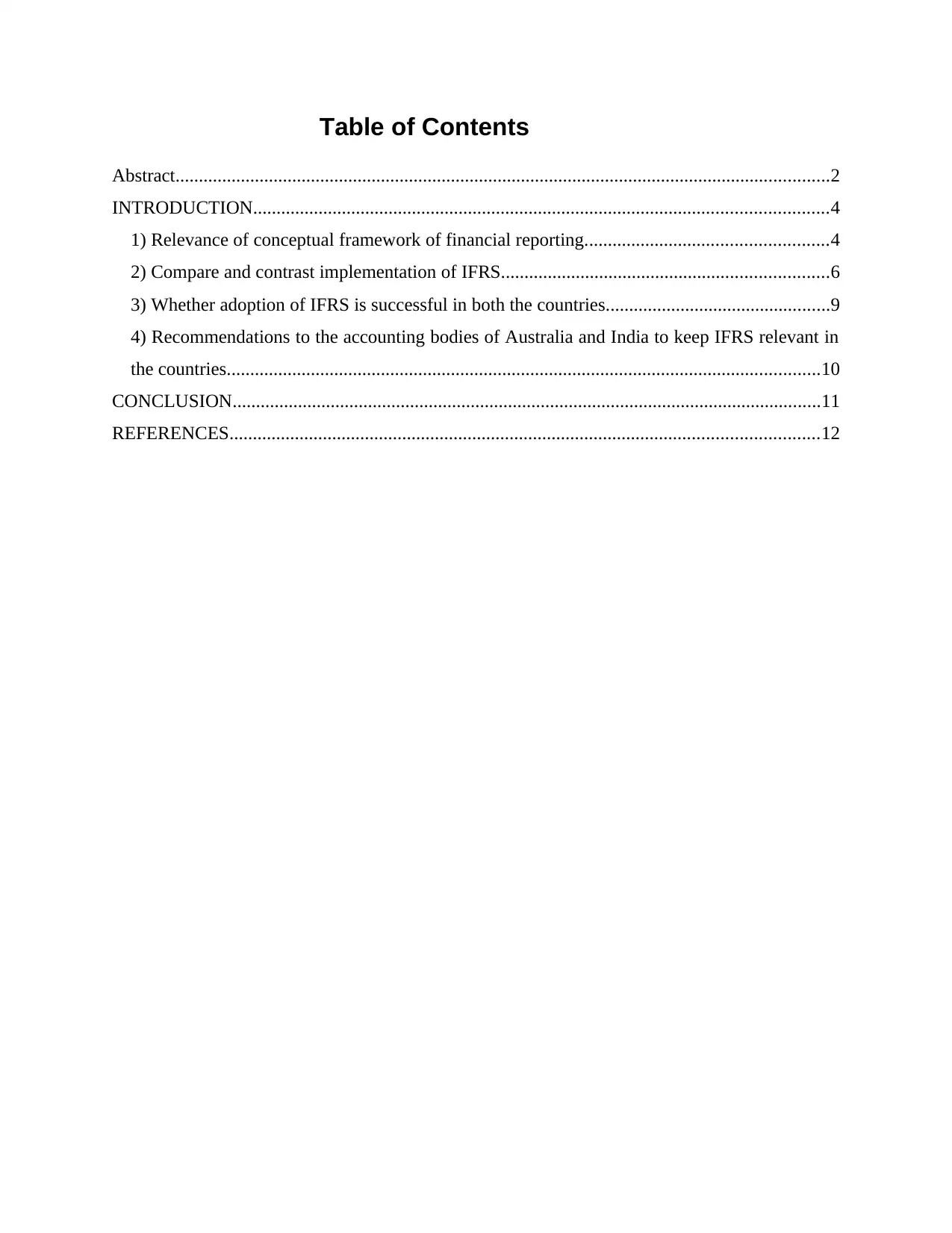
Table of Contents
Abstract............................................................................................................................................2
INTRODUCTION...........................................................................................................................4
1) Relevance of conceptual framework of financial reporting....................................................4
2) Compare and contrast implementation of IFRS......................................................................6
3) Whether adoption of IFRS is successful in both the countries................................................9
4) Recommendations to the accounting bodies of Australia and India to keep IFRS relevant in
the countries...............................................................................................................................10
CONCLUSION..............................................................................................................................11
REFERENCES..............................................................................................................................12
Abstract............................................................................................................................................2
INTRODUCTION...........................................................................................................................4
1) Relevance of conceptual framework of financial reporting....................................................4
2) Compare and contrast implementation of IFRS......................................................................6
3) Whether adoption of IFRS is successful in both the countries................................................9
4) Recommendations to the accounting bodies of Australia and India to keep IFRS relevant in
the countries...............................................................................................................................10
CONCLUSION..............................................................................................................................11
REFERENCES..............................................................................................................................12
⊘ This is a preview!⊘
Do you want full access?
Subscribe today to unlock all pages.

Trusted by 1+ million students worldwide
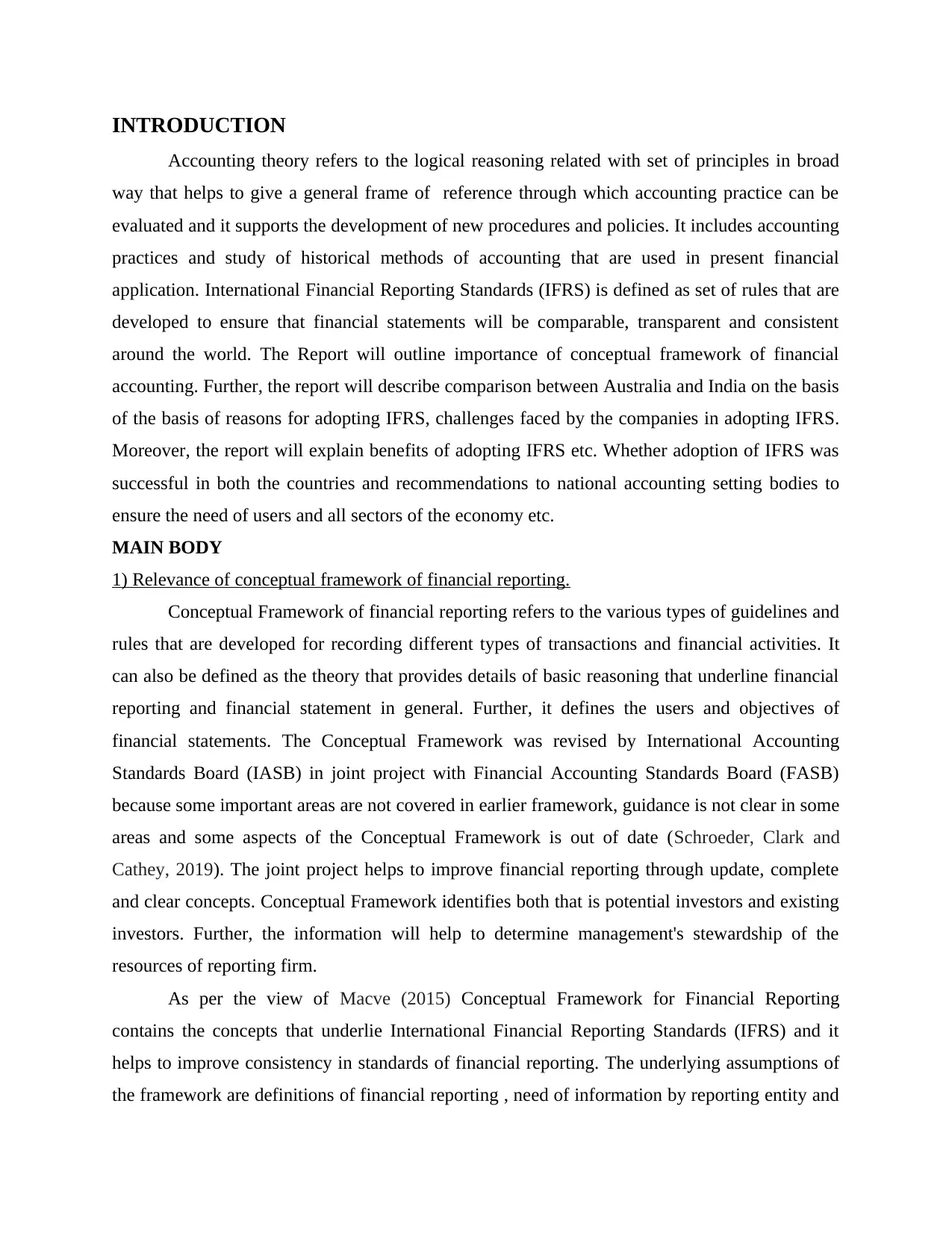
INTRODUCTION
Accounting theory refers to the logical reasoning related with set of principles in broad
way that helps to give a general frame of reference through which accounting practice can be
evaluated and it supports the development of new procedures and policies. It includes accounting
practices and study of historical methods of accounting that are used in present financial
application. International Financial Reporting Standards (IFRS) is defined as set of rules that are
developed to ensure that financial statements will be comparable, transparent and consistent
around the world. The Report will outline importance of conceptual framework of financial
accounting. Further, the report will describe comparison between Australia and India on the basis
of the basis of reasons for adopting IFRS, challenges faced by the companies in adopting IFRS.
Moreover, the report will explain benefits of adopting IFRS etc. Whether adoption of IFRS was
successful in both the countries and recommendations to national accounting setting bodies to
ensure the need of users and all sectors of the economy etc.
MAIN BODY
1) Relevance of conceptual framework of financial reporting.
Conceptual Framework of financial reporting refers to the various types of guidelines and
rules that are developed for recording different types of transactions and financial activities. It
can also be defined as the theory that provides details of basic reasoning that underline financial
reporting and financial statement in general. Further, it defines the users and objectives of
financial statements. The Conceptual Framework was revised by International Accounting
Standards Board (IASB) in joint project with Financial Accounting Standards Board (FASB)
because some important areas are not covered in earlier framework, guidance is not clear in some
areas and some aspects of the Conceptual Framework is out of date (Schroeder, Clark and
Cathey, 2019). The joint project helps to improve financial reporting through update, complete
and clear concepts. Conceptual Framework identifies both that is potential investors and existing
investors. Further, the information will help to determine management's stewardship of the
resources of reporting firm.
As per the view of Macve (2015) Conceptual Framework for Financial Reporting
contains the concepts that underlie International Financial Reporting Standards (IFRS) and it
helps to improve consistency in standards of financial reporting. The underlying assumptions of
the framework are definitions of financial reporting , need of information by reporting entity and
Accounting theory refers to the logical reasoning related with set of principles in broad
way that helps to give a general frame of reference through which accounting practice can be
evaluated and it supports the development of new procedures and policies. It includes accounting
practices and study of historical methods of accounting that are used in present financial
application. International Financial Reporting Standards (IFRS) is defined as set of rules that are
developed to ensure that financial statements will be comparable, transparent and consistent
around the world. The Report will outline importance of conceptual framework of financial
accounting. Further, the report will describe comparison between Australia and India on the basis
of the basis of reasons for adopting IFRS, challenges faced by the companies in adopting IFRS.
Moreover, the report will explain benefits of adopting IFRS etc. Whether adoption of IFRS was
successful in both the countries and recommendations to national accounting setting bodies to
ensure the need of users and all sectors of the economy etc.
MAIN BODY
1) Relevance of conceptual framework of financial reporting.
Conceptual Framework of financial reporting refers to the various types of guidelines and
rules that are developed for recording different types of transactions and financial activities. It
can also be defined as the theory that provides details of basic reasoning that underline financial
reporting and financial statement in general. Further, it defines the users and objectives of
financial statements. The Conceptual Framework was revised by International Accounting
Standards Board (IASB) in joint project with Financial Accounting Standards Board (FASB)
because some important areas are not covered in earlier framework, guidance is not clear in some
areas and some aspects of the Conceptual Framework is out of date (Schroeder, Clark and
Cathey, 2019). The joint project helps to improve financial reporting through update, complete
and clear concepts. Conceptual Framework identifies both that is potential investors and existing
investors. Further, the information will help to determine management's stewardship of the
resources of reporting firm.
As per the view of Macve (2015) Conceptual Framework for Financial Reporting
contains the concepts that underlie International Financial Reporting Standards (IFRS) and it
helps to improve consistency in standards of financial reporting. The underlying assumptions of
the framework are definitions of financial reporting , need of information by reporting entity and
Paraphrase This Document
Need a fresh take? Get an instant paraphrase of this document with our AI Paraphraser
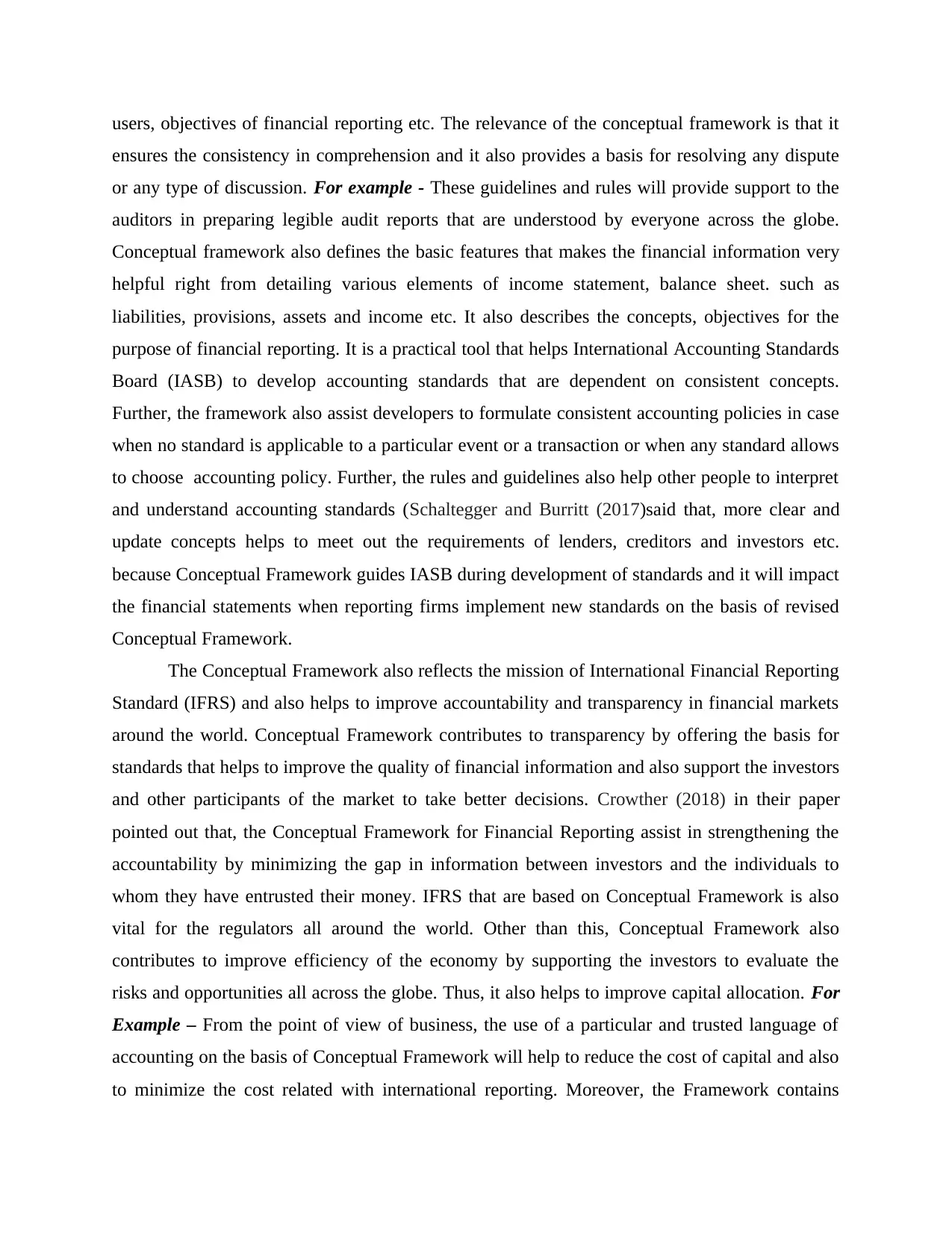
users, objectives of financial reporting etc. The relevance of the conceptual framework is that it
ensures the consistency in comprehension and it also provides a basis for resolving any dispute
or any type of discussion. For example - These guidelines and rules will provide support to the
auditors in preparing legible audit reports that are understood by everyone across the globe.
Conceptual framework also defines the basic features that makes the financial information very
helpful right from detailing various elements of income statement, balance sheet. such as
liabilities, provisions, assets and income etc. It also describes the concepts, objectives for the
purpose of financial reporting. It is a practical tool that helps International Accounting Standards
Board (IASB) to develop accounting standards that are dependent on consistent concepts.
Further, the framework also assist developers to formulate consistent accounting policies in case
when no standard is applicable to a particular event or a transaction or when any standard allows
to choose accounting policy. Further, the rules and guidelines also help other people to interpret
and understand accounting standards (Schaltegger and Burritt (2017)said that, more clear and
update concepts helps to meet out the requirements of lenders, creditors and investors etc.
because Conceptual Framework guides IASB during development of standards and it will impact
the financial statements when reporting firms implement new standards on the basis of revised
Conceptual Framework.
The Conceptual Framework also reflects the mission of International Financial Reporting
Standard (IFRS) and also helps to improve accountability and transparency in financial markets
around the world. Conceptual Framework contributes to transparency by offering the basis for
standards that helps to improve the quality of financial information and also support the investors
and other participants of the market to take better decisions. Crowther (2018) in their paper
pointed out that, the Conceptual Framework for Financial Reporting assist in strengthening the
accountability by minimizing the gap in information between investors and the individuals to
whom they have entrusted their money. IFRS that are based on Conceptual Framework is also
vital for the regulators all around the world. Other than this, Conceptual Framework also
contributes to improve efficiency of the economy by supporting the investors to evaluate the
risks and opportunities all across the globe. Thus, it also helps to improve capital allocation. For
Example – From the point of view of business, the use of a particular and trusted language of
accounting on the basis of Conceptual Framework will help to reduce the cost of capital and also
to minimize the cost related with international reporting. Moreover, the Framework contains
ensures the consistency in comprehension and it also provides a basis for resolving any dispute
or any type of discussion. For example - These guidelines and rules will provide support to the
auditors in preparing legible audit reports that are understood by everyone across the globe.
Conceptual framework also defines the basic features that makes the financial information very
helpful right from detailing various elements of income statement, balance sheet. such as
liabilities, provisions, assets and income etc. It also describes the concepts, objectives for the
purpose of financial reporting. It is a practical tool that helps International Accounting Standards
Board (IASB) to develop accounting standards that are dependent on consistent concepts.
Further, the framework also assist developers to formulate consistent accounting policies in case
when no standard is applicable to a particular event or a transaction or when any standard allows
to choose accounting policy. Further, the rules and guidelines also help other people to interpret
and understand accounting standards (Schaltegger and Burritt (2017)said that, more clear and
update concepts helps to meet out the requirements of lenders, creditors and investors etc.
because Conceptual Framework guides IASB during development of standards and it will impact
the financial statements when reporting firms implement new standards on the basis of revised
Conceptual Framework.
The Conceptual Framework also reflects the mission of International Financial Reporting
Standard (IFRS) and also helps to improve accountability and transparency in financial markets
around the world. Conceptual Framework contributes to transparency by offering the basis for
standards that helps to improve the quality of financial information and also support the investors
and other participants of the market to take better decisions. Crowther (2018) in their paper
pointed out that, the Conceptual Framework for Financial Reporting assist in strengthening the
accountability by minimizing the gap in information between investors and the individuals to
whom they have entrusted their money. IFRS that are based on Conceptual Framework is also
vital for the regulators all around the world. Other than this, Conceptual Framework also
contributes to improve efficiency of the economy by supporting the investors to evaluate the
risks and opportunities all across the globe. Thus, it also helps to improve capital allocation. For
Example – From the point of view of business, the use of a particular and trusted language of
accounting on the basis of Conceptual Framework will help to reduce the cost of capital and also
to minimize the cost related with international reporting. Moreover, the Framework contains
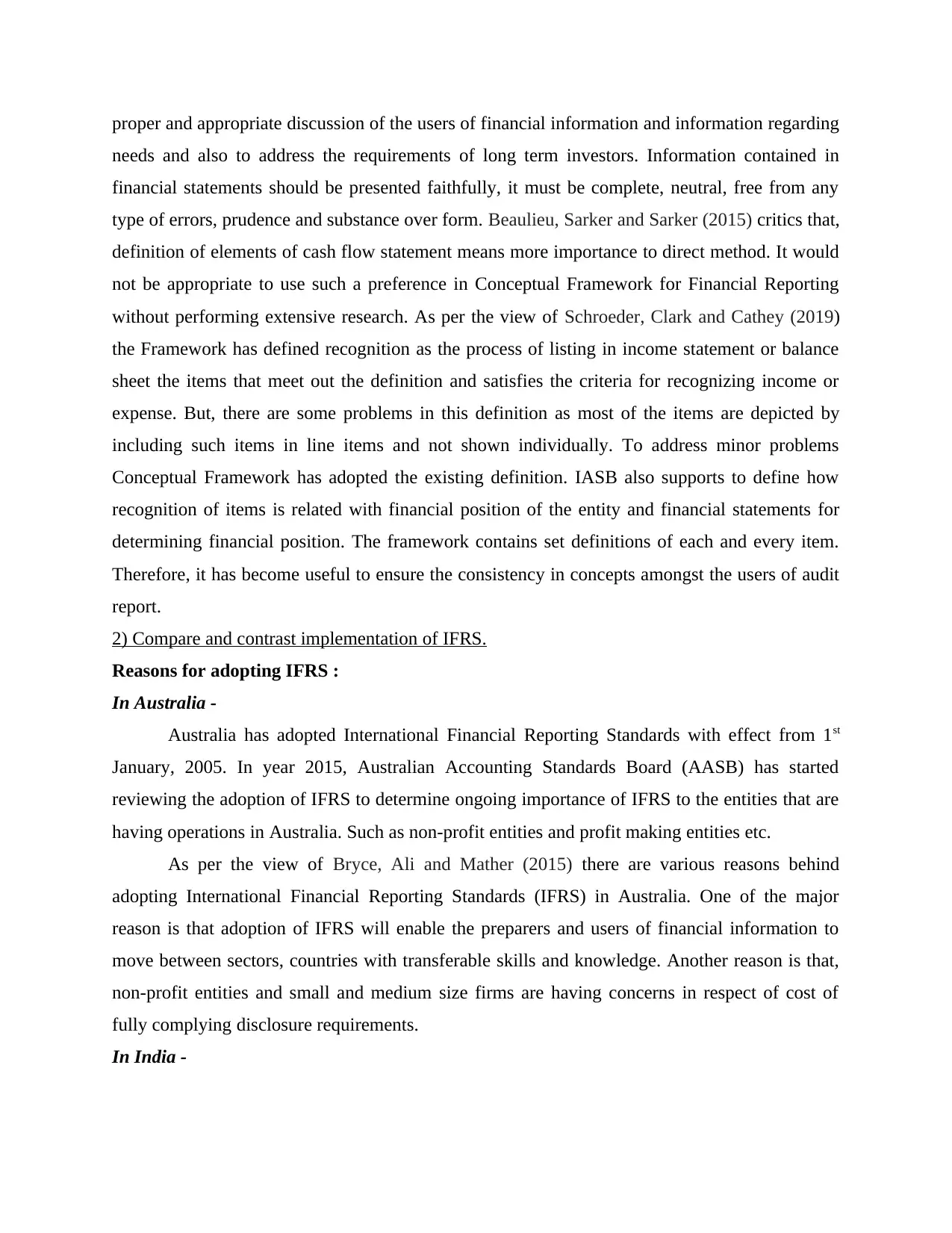
proper and appropriate discussion of the users of financial information and information regarding
needs and also to address the requirements of long term investors. Information contained in
financial statements should be presented faithfully, it must be complete, neutral, free from any
type of errors, prudence and substance over form. Beaulieu, Sarker and Sarker (2015) critics that,
definition of elements of cash flow statement means more importance to direct method. It would
not be appropriate to use such a preference in Conceptual Framework for Financial Reporting
without performing extensive research. As per the view of Schroeder, Clark and Cathey (2019)
the Framework has defined recognition as the process of listing in income statement or balance
sheet the items that meet out the definition and satisfies the criteria for recognizing income or
expense. But, there are some problems in this definition as most of the items are depicted by
including such items in line items and not shown individually. To address minor problems
Conceptual Framework has adopted the existing definition. IASB also supports to define how
recognition of items is related with financial position of the entity and financial statements for
determining financial position. The framework contains set definitions of each and every item.
Therefore, it has become useful to ensure the consistency in concepts amongst the users of audit
report.
2) Compare and contrast implementation of IFRS.
Reasons for adopting IFRS :
In Australia -
Australia has adopted International Financial Reporting Standards with effect from 1st
January, 2005. In year 2015, Australian Accounting Standards Board (AASB) has started
reviewing the adoption of IFRS to determine ongoing importance of IFRS to the entities that are
having operations in Australia. Such as non-profit entities and profit making entities etc.
As per the view of Bryce, Ali and Mather (2015) there are various reasons behind
adopting International Financial Reporting Standards (IFRS) in Australia. One of the major
reason is that adoption of IFRS will enable the preparers and users of financial information to
move between sectors, countries with transferable skills and knowledge. Another reason is that,
non-profit entities and small and medium size firms are having concerns in respect of cost of
fully complying disclosure requirements.
In India -
needs and also to address the requirements of long term investors. Information contained in
financial statements should be presented faithfully, it must be complete, neutral, free from any
type of errors, prudence and substance over form. Beaulieu, Sarker and Sarker (2015) critics that,
definition of elements of cash flow statement means more importance to direct method. It would
not be appropriate to use such a preference in Conceptual Framework for Financial Reporting
without performing extensive research. As per the view of Schroeder, Clark and Cathey (2019)
the Framework has defined recognition as the process of listing in income statement or balance
sheet the items that meet out the definition and satisfies the criteria for recognizing income or
expense. But, there are some problems in this definition as most of the items are depicted by
including such items in line items and not shown individually. To address minor problems
Conceptual Framework has adopted the existing definition. IASB also supports to define how
recognition of items is related with financial position of the entity and financial statements for
determining financial position. The framework contains set definitions of each and every item.
Therefore, it has become useful to ensure the consistency in concepts amongst the users of audit
report.
2) Compare and contrast implementation of IFRS.
Reasons for adopting IFRS :
In Australia -
Australia has adopted International Financial Reporting Standards with effect from 1st
January, 2005. In year 2015, Australian Accounting Standards Board (AASB) has started
reviewing the adoption of IFRS to determine ongoing importance of IFRS to the entities that are
having operations in Australia. Such as non-profit entities and profit making entities etc.
As per the view of Bryce, Ali and Mather (2015) there are various reasons behind
adopting International Financial Reporting Standards (IFRS) in Australia. One of the major
reason is that adoption of IFRS will enable the preparers and users of financial information to
move between sectors, countries with transferable skills and knowledge. Another reason is that,
non-profit entities and small and medium size firms are having concerns in respect of cost of
fully complying disclosure requirements.
In India -
⊘ This is a preview!⊘
Do you want full access?
Subscribe today to unlock all pages.

Trusted by 1+ million students worldwide
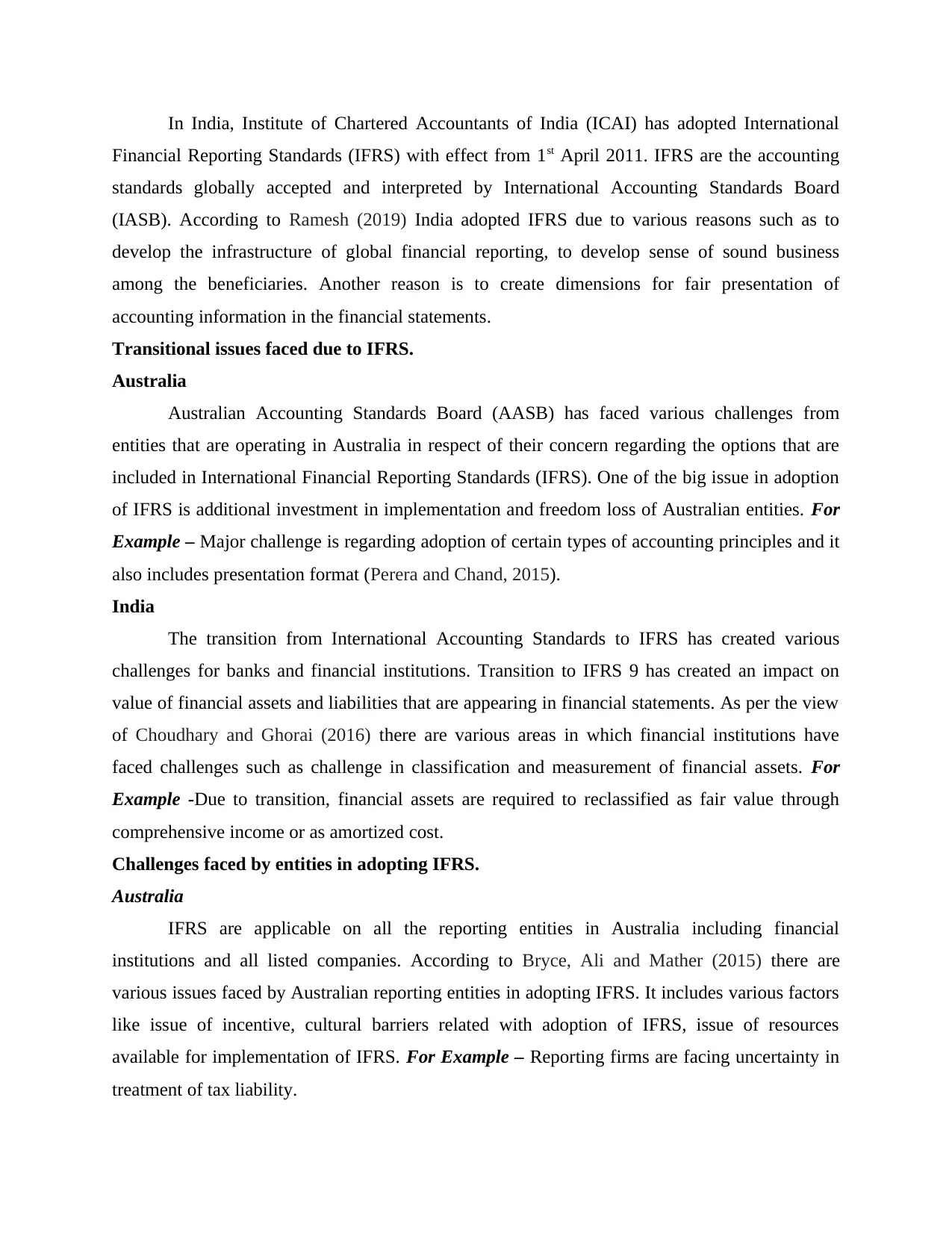
In India, Institute of Chartered Accountants of India (ICAI) has adopted International
Financial Reporting Standards (IFRS) with effect from 1st April 2011. IFRS are the accounting
standards globally accepted and interpreted by International Accounting Standards Board
(IASB). According to Ramesh (2019) India adopted IFRS due to various reasons such as to
develop the infrastructure of global financial reporting, to develop sense of sound business
among the beneficiaries. Another reason is to create dimensions for fair presentation of
accounting information in the financial statements.
Transitional issues faced due to IFRS.
Australia
Australian Accounting Standards Board (AASB) has faced various challenges from
entities that are operating in Australia in respect of their concern regarding the options that are
included in International Financial Reporting Standards (IFRS). One of the big issue in adoption
of IFRS is additional investment in implementation and freedom loss of Australian entities. For
Example – Major challenge is regarding adoption of certain types of accounting principles and it
also includes presentation format (Perera and Chand, 2015).
India
The transition from International Accounting Standards to IFRS has created various
challenges for banks and financial institutions. Transition to IFRS 9 has created an impact on
value of financial assets and liabilities that are appearing in financial statements. As per the view
of Choudhary and Ghorai (2016) there are various areas in which financial institutions have
faced challenges such as challenge in classification and measurement of financial assets. For
Example -Due to transition, financial assets are required to reclassified as fair value through
comprehensive income or as amortized cost.
Challenges faced by entities in adopting IFRS.
Australia
IFRS are applicable on all the reporting entities in Australia including financial
institutions and all listed companies. According to Bryce, Ali and Mather (2015) there are
various issues faced by Australian reporting entities in adopting IFRS. It includes various factors
like issue of incentive, cultural barriers related with adoption of IFRS, issue of resources
available for implementation of IFRS. For Example – Reporting firms are facing uncertainty in
treatment of tax liability.
Financial Reporting Standards (IFRS) with effect from 1st April 2011. IFRS are the accounting
standards globally accepted and interpreted by International Accounting Standards Board
(IASB). According to Ramesh (2019) India adopted IFRS due to various reasons such as to
develop the infrastructure of global financial reporting, to develop sense of sound business
among the beneficiaries. Another reason is to create dimensions for fair presentation of
accounting information in the financial statements.
Transitional issues faced due to IFRS.
Australia
Australian Accounting Standards Board (AASB) has faced various challenges from
entities that are operating in Australia in respect of their concern regarding the options that are
included in International Financial Reporting Standards (IFRS). One of the big issue in adoption
of IFRS is additional investment in implementation and freedom loss of Australian entities. For
Example – Major challenge is regarding adoption of certain types of accounting principles and it
also includes presentation format (Perera and Chand, 2015).
India
The transition from International Accounting Standards to IFRS has created various
challenges for banks and financial institutions. Transition to IFRS 9 has created an impact on
value of financial assets and liabilities that are appearing in financial statements. As per the view
of Choudhary and Ghorai (2016) there are various areas in which financial institutions have
faced challenges such as challenge in classification and measurement of financial assets. For
Example -Due to transition, financial assets are required to reclassified as fair value through
comprehensive income or as amortized cost.
Challenges faced by entities in adopting IFRS.
Australia
IFRS are applicable on all the reporting entities in Australia including financial
institutions and all listed companies. According to Bryce, Ali and Mather (2015) there are
various issues faced by Australian reporting entities in adopting IFRS. It includes various factors
like issue of incentive, cultural barriers related with adoption of IFRS, issue of resources
available for implementation of IFRS. For Example – Reporting firms are facing uncertainty in
treatment of tax liability.
Paraphrase This Document
Need a fresh take? Get an instant paraphrase of this document with our AI Paraphraser
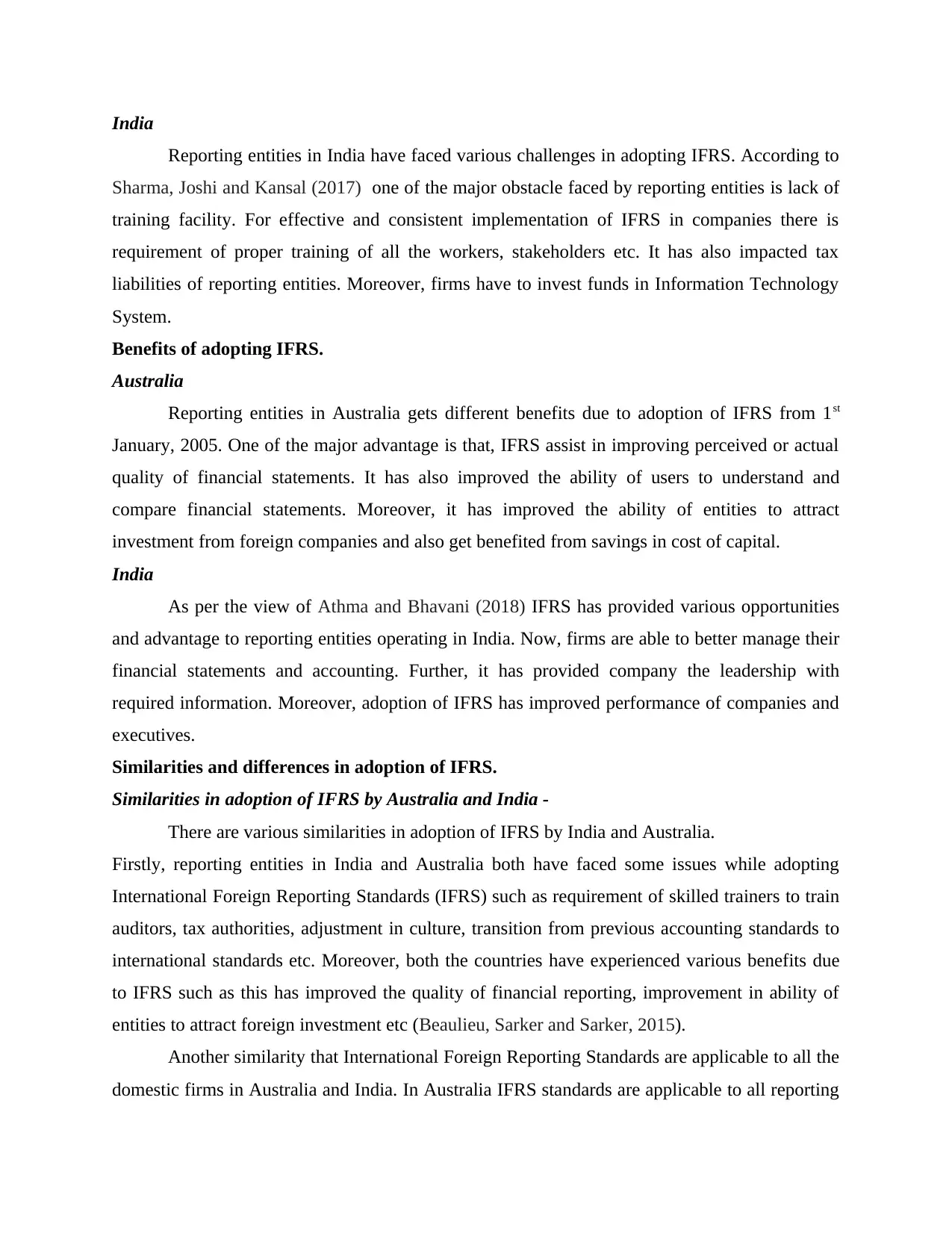
India
Reporting entities in India have faced various challenges in adopting IFRS. According to
Sharma, Joshi and Kansal (2017) one of the major obstacle faced by reporting entities is lack of
training facility. For effective and consistent implementation of IFRS in companies there is
requirement of proper training of all the workers, stakeholders etc. It has also impacted tax
liabilities of reporting entities. Moreover, firms have to invest funds in Information Technology
System.
Benefits of adopting IFRS.
Australia
Reporting entities in Australia gets different benefits due to adoption of IFRS from 1st
January, 2005. One of the major advantage is that, IFRS assist in improving perceived or actual
quality of financial statements. It has also improved the ability of users to understand and
compare financial statements. Moreover, it has improved the ability of entities to attract
investment from foreign companies and also get benefited from savings in cost of capital.
India
As per the view of Athma and Bhavani (2018) IFRS has provided various opportunities
and advantage to reporting entities operating in India. Now, firms are able to better manage their
financial statements and accounting. Further, it has provided company the leadership with
required information. Moreover, adoption of IFRS has improved performance of companies and
executives.
Similarities and differences in adoption of IFRS.
Similarities in adoption of IFRS by Australia and India -
There are various similarities in adoption of IFRS by India and Australia.
Firstly, reporting entities in India and Australia both have faced some issues while adopting
International Foreign Reporting Standards (IFRS) such as requirement of skilled trainers to train
auditors, tax authorities, adjustment in culture, transition from previous accounting standards to
international standards etc. Moreover, both the countries have experienced various benefits due
to IFRS such as this has improved the quality of financial reporting, improvement in ability of
entities to attract foreign investment etc (Beaulieu, Sarker and Sarker, 2015).
Another similarity that International Foreign Reporting Standards are applicable to all the
domestic firms in Australia and India. In Australia IFRS standards are applicable to all reporting
Reporting entities in India have faced various challenges in adopting IFRS. According to
Sharma, Joshi and Kansal (2017) one of the major obstacle faced by reporting entities is lack of
training facility. For effective and consistent implementation of IFRS in companies there is
requirement of proper training of all the workers, stakeholders etc. It has also impacted tax
liabilities of reporting entities. Moreover, firms have to invest funds in Information Technology
System.
Benefits of adopting IFRS.
Australia
Reporting entities in Australia gets different benefits due to adoption of IFRS from 1st
January, 2005. One of the major advantage is that, IFRS assist in improving perceived or actual
quality of financial statements. It has also improved the ability of users to understand and
compare financial statements. Moreover, it has improved the ability of entities to attract
investment from foreign companies and also get benefited from savings in cost of capital.
India
As per the view of Athma and Bhavani (2018) IFRS has provided various opportunities
and advantage to reporting entities operating in India. Now, firms are able to better manage their
financial statements and accounting. Further, it has provided company the leadership with
required information. Moreover, adoption of IFRS has improved performance of companies and
executives.
Similarities and differences in adoption of IFRS.
Similarities in adoption of IFRS by Australia and India -
There are various similarities in adoption of IFRS by India and Australia.
Firstly, reporting entities in India and Australia both have faced some issues while adopting
International Foreign Reporting Standards (IFRS) such as requirement of skilled trainers to train
auditors, tax authorities, adjustment in culture, transition from previous accounting standards to
international standards etc. Moreover, both the countries have experienced various benefits due
to IFRS such as this has improved the quality of financial reporting, improvement in ability of
entities to attract foreign investment etc (Beaulieu, Sarker and Sarker, 2015).
Another similarity that International Foreign Reporting Standards are applicable to all the
domestic firms in Australia and India. In Australia IFRS standards are applicable to all reporting
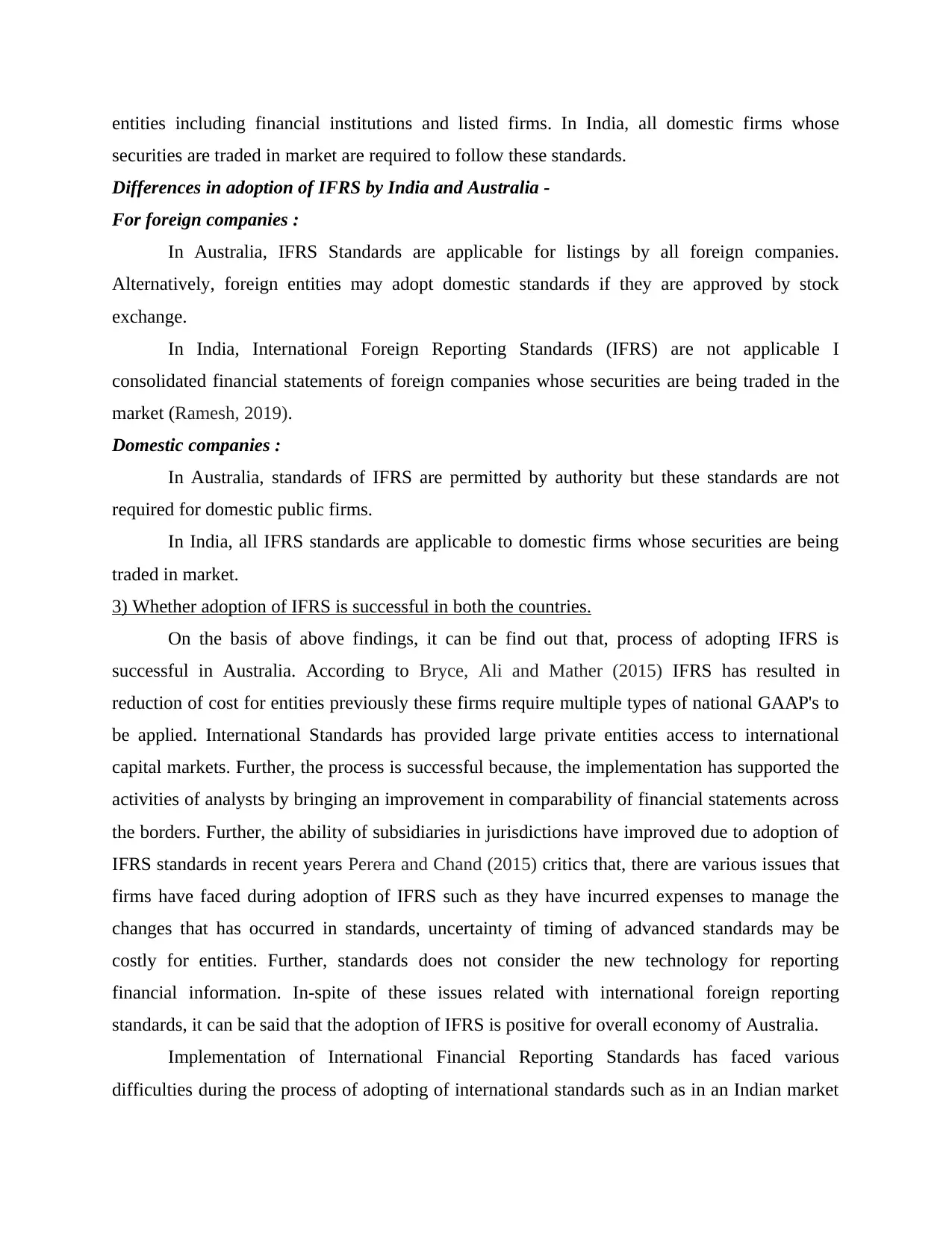
entities including financial institutions and listed firms. In India, all domestic firms whose
securities are traded in market are required to follow these standards.
Differences in adoption of IFRS by India and Australia -
For foreign companies :
In Australia, IFRS Standards are applicable for listings by all foreign companies.
Alternatively, foreign entities may adopt domestic standards if they are approved by stock
exchange.
In India, International Foreign Reporting Standards (IFRS) are not applicable I
consolidated financial statements of foreign companies whose securities are being traded in the
market (Ramesh, 2019).
Domestic companies :
In Australia, standards of IFRS are permitted by authority but these standards are not
required for domestic public firms.
In India, all IFRS standards are applicable to domestic firms whose securities are being
traded in market.
3) Whether adoption of IFRS is successful in both the countries.
On the basis of above findings, it can be find out that, process of adopting IFRS is
successful in Australia. According to Bryce, Ali and Mather (2015) IFRS has resulted in
reduction of cost for entities previously these firms require multiple types of national GAAP's to
be applied. International Standards has provided large private entities access to international
capital markets. Further, the process is successful because, the implementation has supported the
activities of analysts by bringing an improvement in comparability of financial statements across
the borders. Further, the ability of subsidiaries in jurisdictions have improved due to adoption of
IFRS standards in recent years Perera and Chand (2015) critics that, there are various issues that
firms have faced during adoption of IFRS such as they have incurred expenses to manage the
changes that has occurred in standards, uncertainty of timing of advanced standards may be
costly for entities. Further, standards does not consider the new technology for reporting
financial information. In-spite of these issues related with international foreign reporting
standards, it can be said that the adoption of IFRS is positive for overall economy of Australia.
Implementation of International Financial Reporting Standards has faced various
difficulties during the process of adopting of international standards such as in an Indian market
securities are traded in market are required to follow these standards.
Differences in adoption of IFRS by India and Australia -
For foreign companies :
In Australia, IFRS Standards are applicable for listings by all foreign companies.
Alternatively, foreign entities may adopt domestic standards if they are approved by stock
exchange.
In India, International Foreign Reporting Standards (IFRS) are not applicable I
consolidated financial statements of foreign companies whose securities are being traded in the
market (Ramesh, 2019).
Domestic companies :
In Australia, standards of IFRS are permitted by authority but these standards are not
required for domestic public firms.
In India, all IFRS standards are applicable to domestic firms whose securities are being
traded in market.
3) Whether adoption of IFRS is successful in both the countries.
On the basis of above findings, it can be find out that, process of adopting IFRS is
successful in Australia. According to Bryce, Ali and Mather (2015) IFRS has resulted in
reduction of cost for entities previously these firms require multiple types of national GAAP's to
be applied. International Standards has provided large private entities access to international
capital markets. Further, the process is successful because, the implementation has supported the
activities of analysts by bringing an improvement in comparability of financial statements across
the borders. Further, the ability of subsidiaries in jurisdictions have improved due to adoption of
IFRS standards in recent years Perera and Chand (2015) critics that, there are various issues that
firms have faced during adoption of IFRS such as they have incurred expenses to manage the
changes that has occurred in standards, uncertainty of timing of advanced standards may be
costly for entities. Further, standards does not consider the new technology for reporting
financial information. In-spite of these issues related with international foreign reporting
standards, it can be said that the adoption of IFRS is positive for overall economy of Australia.
Implementation of International Financial Reporting Standards has faced various
difficulties during the process of adopting of international standards such as in an Indian market
⊘ This is a preview!⊘
Do you want full access?
Subscribe today to unlock all pages.

Trusted by 1+ million students worldwide
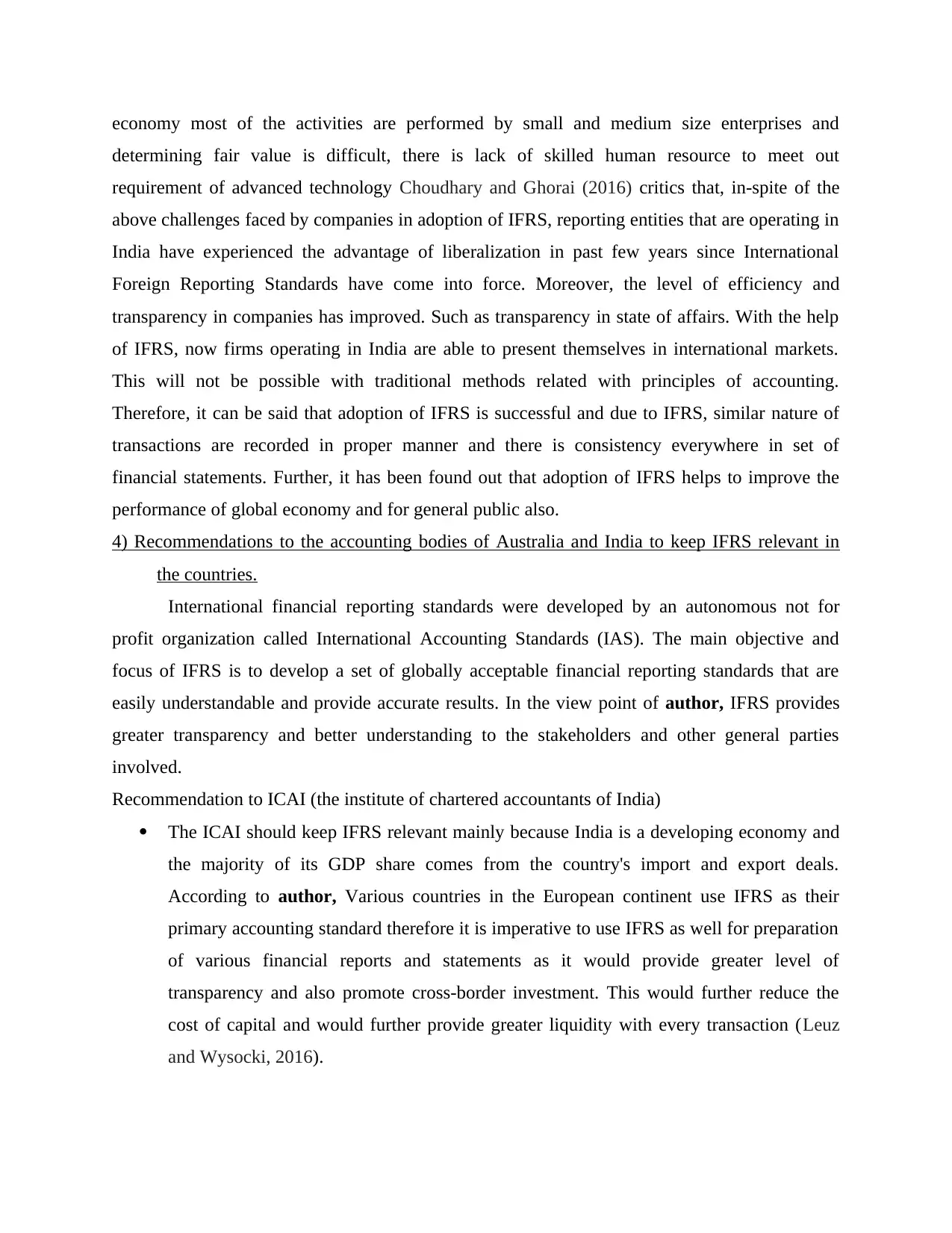
economy most of the activities are performed by small and medium size enterprises and
determining fair value is difficult, there is lack of skilled human resource to meet out
requirement of advanced technology Choudhary and Ghorai (2016) critics that, in-spite of the
above challenges faced by companies in adoption of IFRS, reporting entities that are operating in
India have experienced the advantage of liberalization in past few years since International
Foreign Reporting Standards have come into force. Moreover, the level of efficiency and
transparency in companies has improved. Such as transparency in state of affairs. With the help
of IFRS, now firms operating in India are able to present themselves in international markets.
This will not be possible with traditional methods related with principles of accounting.
Therefore, it can be said that adoption of IFRS is successful and due to IFRS, similar nature of
transactions are recorded in proper manner and there is consistency everywhere in set of
financial statements. Further, it has been found out that adoption of IFRS helps to improve the
performance of global economy and for general public also.
4) Recommendations to the accounting bodies of Australia and India to keep IFRS relevant in
the countries.
International financial reporting standards were developed by an autonomous not for
profit organization called International Accounting Standards (IAS). The main objective and
focus of IFRS is to develop a set of globally acceptable financial reporting standards that are
easily understandable and provide accurate results. In the view point of author, IFRS provides
greater transparency and better understanding to the stakeholders and other general parties
involved.
Recommendation to ICAI (the institute of chartered accountants of India)
The ICAI should keep IFRS relevant mainly because India is a developing economy and
the majority of its GDP share comes from the country's import and export deals.
According to author, Various countries in the European continent use IFRS as their
primary accounting standard therefore it is imperative to use IFRS as well for preparation
of various financial reports and statements as it would provide greater level of
transparency and also promote cross-border investment. This would further reduce the
cost of capital and would further provide greater liquidity with every transaction (Leuz
and Wysocki, 2016).
determining fair value is difficult, there is lack of skilled human resource to meet out
requirement of advanced technology Choudhary and Ghorai (2016) critics that, in-spite of the
above challenges faced by companies in adoption of IFRS, reporting entities that are operating in
India have experienced the advantage of liberalization in past few years since International
Foreign Reporting Standards have come into force. Moreover, the level of efficiency and
transparency in companies has improved. Such as transparency in state of affairs. With the help
of IFRS, now firms operating in India are able to present themselves in international markets.
This will not be possible with traditional methods related with principles of accounting.
Therefore, it can be said that adoption of IFRS is successful and due to IFRS, similar nature of
transactions are recorded in proper manner and there is consistency everywhere in set of
financial statements. Further, it has been found out that adoption of IFRS helps to improve the
performance of global economy and for general public also.
4) Recommendations to the accounting bodies of Australia and India to keep IFRS relevant in
the countries.
International financial reporting standards were developed by an autonomous not for
profit organization called International Accounting Standards (IAS). The main objective and
focus of IFRS is to develop a set of globally acceptable financial reporting standards that are
easily understandable and provide accurate results. In the view point of author, IFRS provides
greater transparency and better understanding to the stakeholders and other general parties
involved.
Recommendation to ICAI (the institute of chartered accountants of India)
The ICAI should keep IFRS relevant mainly because India is a developing economy and
the majority of its GDP share comes from the country's import and export deals.
According to author, Various countries in the European continent use IFRS as their
primary accounting standard therefore it is imperative to use IFRS as well for preparation
of various financial reports and statements as it would provide greater level of
transparency and also promote cross-border investment. This would further reduce the
cost of capital and would further provide greater liquidity with every transaction (Leuz
and Wysocki, 2016).
Paraphrase This Document
Need a fresh take? Get an instant paraphrase of this document with our AI Paraphraser
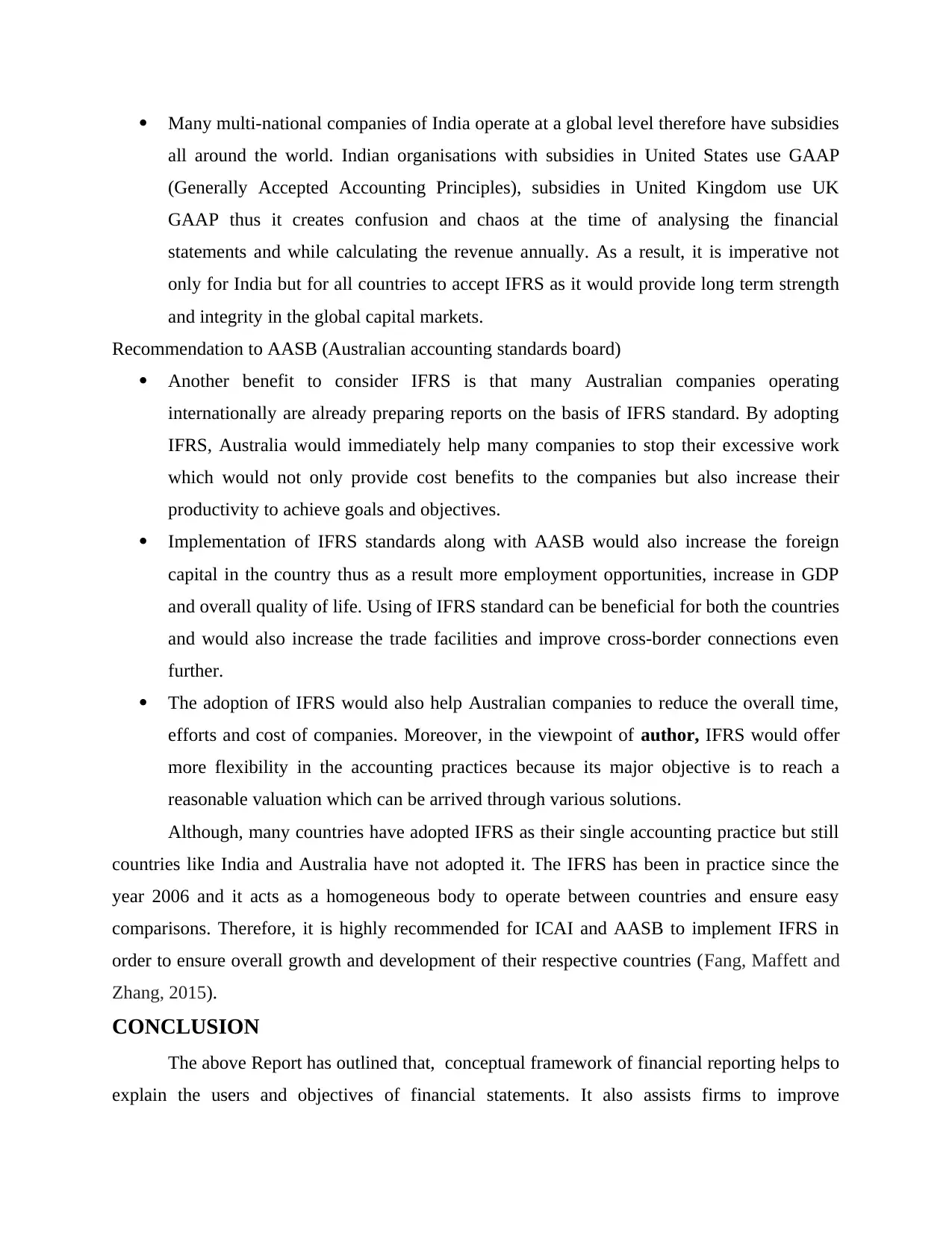
Many multi-national companies of India operate at a global level therefore have subsidies
all around the world. Indian organisations with subsidies in United States use GAAP
(Generally Accepted Accounting Principles), subsidies in United Kingdom use UK
GAAP thus it creates confusion and chaos at the time of analysing the financial
statements and while calculating the revenue annually. As a result, it is imperative not
only for India but for all countries to accept IFRS as it would provide long term strength
and integrity in the global capital markets.
Recommendation to AASB (Australian accounting standards board)
Another benefit to consider IFRS is that many Australian companies operating
internationally are already preparing reports on the basis of IFRS standard. By adopting
IFRS, Australia would immediately help many companies to stop their excessive work
which would not only provide cost benefits to the companies but also increase their
productivity to achieve goals and objectives.
Implementation of IFRS standards along with AASB would also increase the foreign
capital in the country thus as a result more employment opportunities, increase in GDP
and overall quality of life. Using of IFRS standard can be beneficial for both the countries
and would also increase the trade facilities and improve cross-border connections even
further.
The adoption of IFRS would also help Australian companies to reduce the overall time,
efforts and cost of companies. Moreover, in the viewpoint of author, IFRS would offer
more flexibility in the accounting practices because its major objective is to reach a
reasonable valuation which can be arrived through various solutions.
Although, many countries have adopted IFRS as their single accounting practice but still
countries like India and Australia have not adopted it. The IFRS has been in practice since the
year 2006 and it acts as a homogeneous body to operate between countries and ensure easy
comparisons. Therefore, it is highly recommended for ICAI and AASB to implement IFRS in
order to ensure overall growth and development of their respective countries (Fang, Maffett and
Zhang, 2015).
CONCLUSION
The above Report has outlined that, conceptual framework of financial reporting helps to
explain the users and objectives of financial statements. It also assists firms to improve
all around the world. Indian organisations with subsidies in United States use GAAP
(Generally Accepted Accounting Principles), subsidies in United Kingdom use UK
GAAP thus it creates confusion and chaos at the time of analysing the financial
statements and while calculating the revenue annually. As a result, it is imperative not
only for India but for all countries to accept IFRS as it would provide long term strength
and integrity in the global capital markets.
Recommendation to AASB (Australian accounting standards board)
Another benefit to consider IFRS is that many Australian companies operating
internationally are already preparing reports on the basis of IFRS standard. By adopting
IFRS, Australia would immediately help many companies to stop their excessive work
which would not only provide cost benefits to the companies but also increase their
productivity to achieve goals and objectives.
Implementation of IFRS standards along with AASB would also increase the foreign
capital in the country thus as a result more employment opportunities, increase in GDP
and overall quality of life. Using of IFRS standard can be beneficial for both the countries
and would also increase the trade facilities and improve cross-border connections even
further.
The adoption of IFRS would also help Australian companies to reduce the overall time,
efforts and cost of companies. Moreover, in the viewpoint of author, IFRS would offer
more flexibility in the accounting practices because its major objective is to reach a
reasonable valuation which can be arrived through various solutions.
Although, many countries have adopted IFRS as their single accounting practice but still
countries like India and Australia have not adopted it. The IFRS has been in practice since the
year 2006 and it acts as a homogeneous body to operate between countries and ensure easy
comparisons. Therefore, it is highly recommended for ICAI and AASB to implement IFRS in
order to ensure overall growth and development of their respective countries (Fang, Maffett and
Zhang, 2015).
CONCLUSION
The above Report has outlined that, conceptual framework of financial reporting helps to
explain the users and objectives of financial statements. It also assists firms to improve
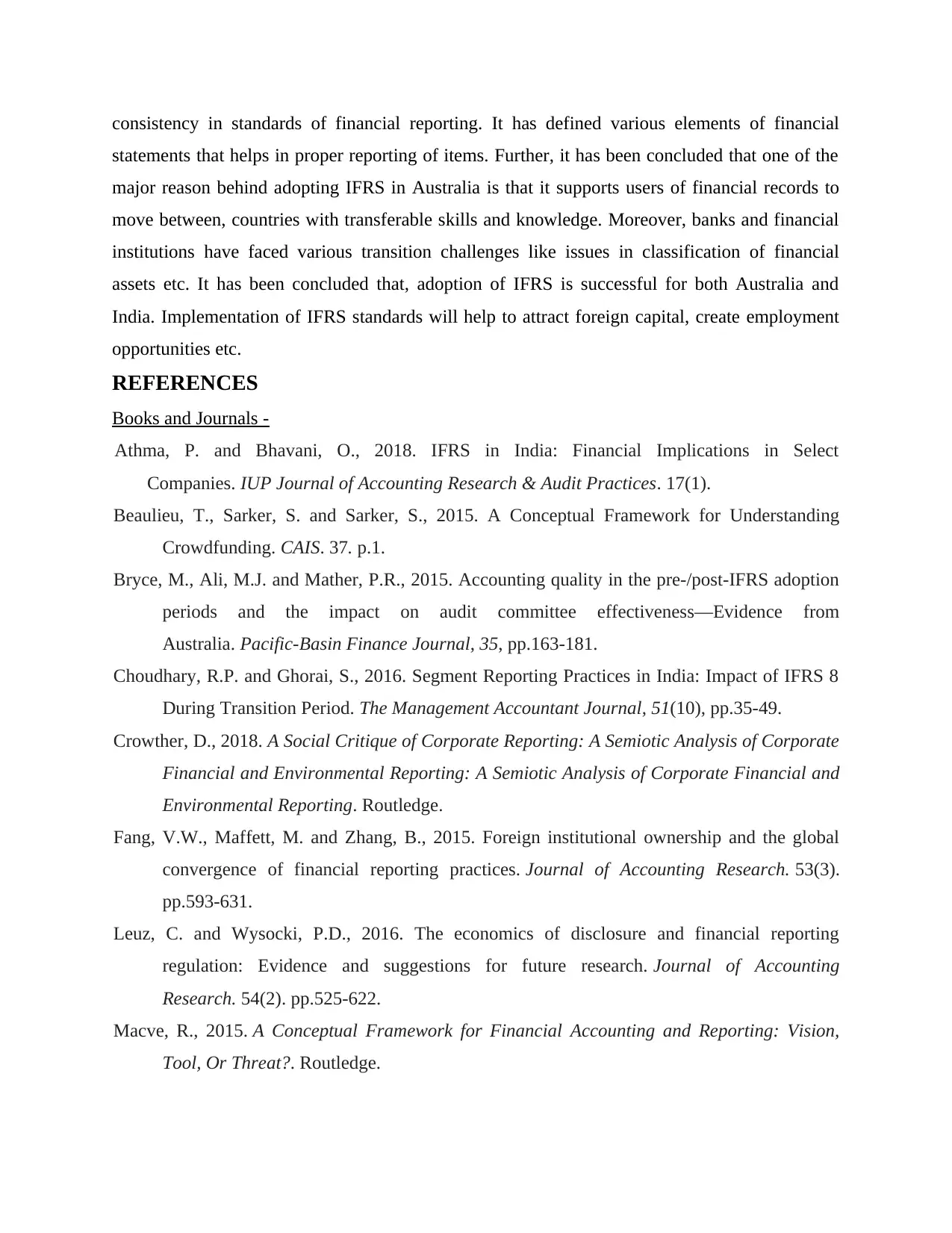
consistency in standards of financial reporting. It has defined various elements of financial
statements that helps in proper reporting of items. Further, it has been concluded that one of the
major reason behind adopting IFRS in Australia is that it supports users of financial records to
move between, countries with transferable skills and knowledge. Moreover, banks and financial
institutions have faced various transition challenges like issues in classification of financial
assets etc. It has been concluded that, adoption of IFRS is successful for both Australia and
India. Implementation of IFRS standards will help to attract foreign capital, create employment
opportunities etc.
REFERENCES
Books and Journals -
Athma, P. and Bhavani, O., 2018. IFRS in India: Financial Implications in Select
Companies. IUP Journal of Accounting Research & Audit Practices. 17(1).
Beaulieu, T., Sarker, S. and Sarker, S., 2015. A Conceptual Framework for Understanding
Crowdfunding. CAIS. 37. p.1.
Bryce, M., Ali, M.J. and Mather, P.R., 2015. Accounting quality in the pre-/post-IFRS adoption
periods and the impact on audit committee effectiveness—Evidence from
Australia. Pacific-Basin Finance Journal, 35, pp.163-181.
Choudhary, R.P. and Ghorai, S., 2016. Segment Reporting Practices in India: Impact of IFRS 8
During Transition Period. The Management Accountant Journal, 51(10), pp.35-49.
Crowther, D., 2018. A Social Critique of Corporate Reporting: A Semiotic Analysis of Corporate
Financial and Environmental Reporting: A Semiotic Analysis of Corporate Financial and
Environmental Reporting. Routledge.
Fang, V.W., Maffett, M. and Zhang, B., 2015. Foreign institutional ownership and the global
convergence of financial reporting practices. Journal of Accounting Research. 53(3).
pp.593-631.
Leuz, C. and Wysocki, P.D., 2016. The economics of disclosure and financial reporting
regulation: Evidence and suggestions for future research. Journal of Accounting
Research. 54(2). pp.525-622.
Macve, R., 2015. A Conceptual Framework for Financial Accounting and Reporting: Vision,
Tool, Or Threat?. Routledge.
statements that helps in proper reporting of items. Further, it has been concluded that one of the
major reason behind adopting IFRS in Australia is that it supports users of financial records to
move between, countries with transferable skills and knowledge. Moreover, banks and financial
institutions have faced various transition challenges like issues in classification of financial
assets etc. It has been concluded that, adoption of IFRS is successful for both Australia and
India. Implementation of IFRS standards will help to attract foreign capital, create employment
opportunities etc.
REFERENCES
Books and Journals -
Athma, P. and Bhavani, O., 2018. IFRS in India: Financial Implications in Select
Companies. IUP Journal of Accounting Research & Audit Practices. 17(1).
Beaulieu, T., Sarker, S. and Sarker, S., 2015. A Conceptual Framework for Understanding
Crowdfunding. CAIS. 37. p.1.
Bryce, M., Ali, M.J. and Mather, P.R., 2015. Accounting quality in the pre-/post-IFRS adoption
periods and the impact on audit committee effectiveness—Evidence from
Australia. Pacific-Basin Finance Journal, 35, pp.163-181.
Choudhary, R.P. and Ghorai, S., 2016. Segment Reporting Practices in India: Impact of IFRS 8
During Transition Period. The Management Accountant Journal, 51(10), pp.35-49.
Crowther, D., 2018. A Social Critique of Corporate Reporting: A Semiotic Analysis of Corporate
Financial and Environmental Reporting: A Semiotic Analysis of Corporate Financial and
Environmental Reporting. Routledge.
Fang, V.W., Maffett, M. and Zhang, B., 2015. Foreign institutional ownership and the global
convergence of financial reporting practices. Journal of Accounting Research. 53(3).
pp.593-631.
Leuz, C. and Wysocki, P.D., 2016. The economics of disclosure and financial reporting
regulation: Evidence and suggestions for future research. Journal of Accounting
Research. 54(2). pp.525-622.
Macve, R., 2015. A Conceptual Framework for Financial Accounting and Reporting: Vision,
Tool, Or Threat?. Routledge.
⊘ This is a preview!⊘
Do you want full access?
Subscribe today to unlock all pages.

Trusted by 1+ million students worldwide
1 out of 15
Related Documents
Your All-in-One AI-Powered Toolkit for Academic Success.
+13062052269
info@desklib.com
Available 24*7 on WhatsApp / Email
![[object Object]](/_next/static/media/star-bottom.7253800d.svg)
Unlock your academic potential
Copyright © 2020–2026 A2Z Services. All Rights Reserved. Developed and managed by ZUCOL.





